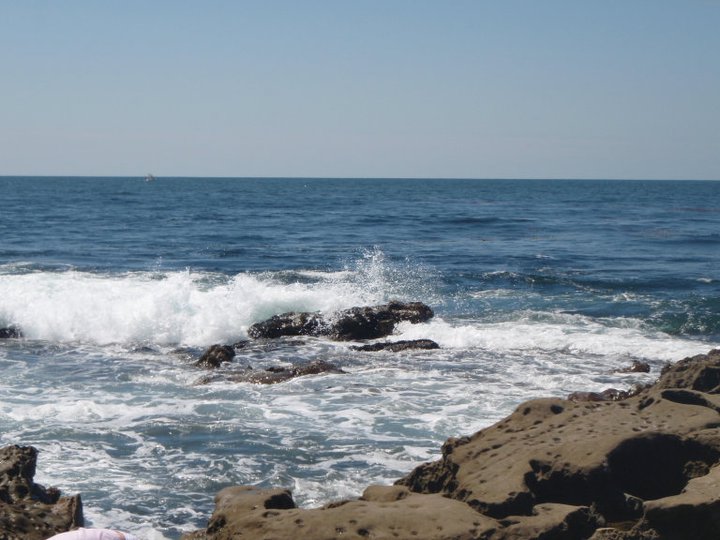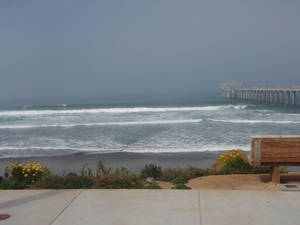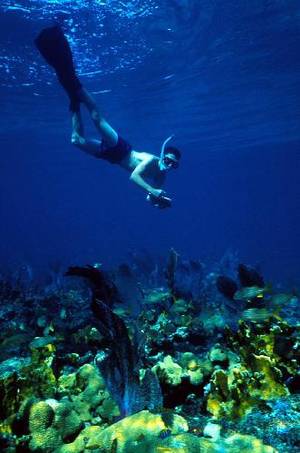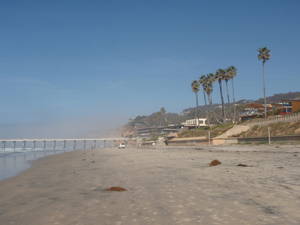Why marine science is the best job in the world
Interview with
 Three marine scientists from Scripps Institution of Oceanography, working in different fields, all explain how they ended up working in marine science, what the best part of the job is (clue: they have a great view of the beach), and give some words of wisdom for anyone thinking of following in their footsteps...
Three marine scientists from Scripps Institution of Oceanography, working in different fields, all explain how they ended up working in marine science, what the best part of the job is (clue: they have a great view of the beach), and give some words of wisdom for anyone thinking of following in their footsteps...
Sarah - I took a trip to Scripps Institution of Oceanography in San Diego California and chatted to a few of the scientists there about how they ended up doing what they do, and what they love about being marine scientists.
To start off with, I asked Paul Jensen, who works on marine microbes, and Miriam Goldstein who works on zooplankton how they ended up working in marine science...
Paul - I grew up in New York City and so I wasn't really exposed to much of the marine environment. But I was always interested in marine science as I think many people are as they're growing up, watching Jacques Cousteau on TV and all those sorts of things.
So when I went to college I found a program where I could major in marine biology and that got ms started. But there are a lot of different paths to a career in this field, and I took a slightly different one, in that my graduate degrees were spread out over time, because I would work for a while, then I would go back to school and get another degree, and so it wasn't necessarily a traditional path.
Miriam - I'm a bit slow perhaps so it was most of the way through college. I started out as an English major and then I needed a job. So, a friend of mine from theatre got me this job in a lab. He said 'Oh you know, you'll like it. You're scanning all these slides", because this was before digital cameras, which makes me sad to say.
So this lab was taking pictures of some of the most biodiverse marine environments in the work, like in the Seychelles. So I scanned all those slides and I started to become really interested and what were these things? And what were the questions that we were asking? So then I got sucked into marine ecology and ended up doing independent research in this lab, and suddenly I was on the path to become a marine biologist.
Sarah - So not everyone takes an obvious route into the job, and you don't have to live by the sea to be inspired by it.
All of the scientists I spoke to agreed that they love what they do. So, I had to ask, what's the best thing about their job and the best part of coming to work each day. First we'll hear from Michael Latz, who showed me some of the beautiful bioluminescent dinoflagellates that he works on in his lab, then Paul and Miriam again...
Michael - Unfortunately, you can't see where we're sitting, but we're in an office overlooking the ocean, the Pacific Ocean, with the waves and there's some dolphins offshore, it's incredibly beautiful.
So, if you want to be a marine biologist it's really nice if you can work along the seashore. And I've been lucky to be able to do that.
So the location is beautiful. Coming in to work, you come to the beach. So, I work at the beach every day.
Paul - The best part of the job is when I'm not coming here to work in my office, but when I'm out in the field, for sure. And that's really the best part of a career in marine science is that you can choose what you're interested in studying and you can choose where you want to study your interests and go there and do field work and be in the water and see some really interesting habitats.
Miriam - There's two best bits. One is that going to sea is fantastic. It's wonderful. I love going to sea and I love seeing my plankton net come up and never know really what's going to be in it, it's different every time.
And then the other fantastic thing is being able to answer the questions that you're asking. Because you're asking these questions of the world and then doing all this work to try to make sense of them, and when something actually does make sense after all the going to sea and in my case, the getting sea sick, and coming back, and all these things, and you're actually able to find out something that no-one else has ever found at. That's an amazing feeling.
Sarah - And Michael agreed with Miriam about the excitement of finding out new things being a major draw of the job...
Michael - The part I like best about the job is the scientific discovery. I love doing experiments. I love figuring out how to develop a protocol of how to do an experiment. I like working in the laboratory, I like working with equipment and computers and putting together essentially and engineering solution for how to do something.
 Sarah - I have to agree that the combination of scientific discovery and those amazing views from the offices at Scripps must be a pretty good incentive to go to work!
Sarah - I have to agree that the combination of scientific discovery and those amazing views from the offices at Scripps must be a pretty good incentive to go to work!
But of course, it's not all 'plain sailing', and not all about going out on research vessels all the time. I asked Miriam what the reality of her life as a marine researcher really is...
The reality is you do get to do expeditions but a month at sea can lead to three years of lab work, and writing. It very much depends on specifically what you're doing. If you are observing marine mammal you're going to do that a lot at sea. But if you're doing something like me with zooplankton you can't really process them on a microscope at sea, so you take a lot of samples, preserve them all as fast as you can, put them in jars, and then you deal with them back at the lab when the ground isn't moving anymore.
I always get sea sick. You can be a marine biologist and get sea sick, there are many excellent marine biologist who spend a significant time shall we see closely observing over the side of the ship.
So I go to sea about once a year for a month and then spend the rest of the year working out those samples and writing work at my computer.
Sarah - I think the seasickness would put me off a little bit, though Miriam did say that her sickness only lasts a couple of days, and that once she's found her sea-legs, she's fine.
So, to succeed as a marine scientist, what kind of person do you need to be? Michael lays out what he feels are the necessary attributes and Paul explains what he's learned from his career so far...
Michael - I think you need to be very curious about the world around you. Very interested in how it works and have a desire to learn. As any kind of scientist you're learning and so that process for me is very inspiring. The goal of gaining knowledge and that knowledge helps us to better understand how the works around us.
Paul - What I've learned from the process is that its probably one third being good at what you do, it's one third luck - being in the right place at the right time - and it's one third persistence. And if you stick with something for a while and you believe in it and you work hard at it then you can end up making a career in doing what you really want to do.









Comments
Marine science
I want to become a professionalist of this field so what should i do?? For this?
Add a comment